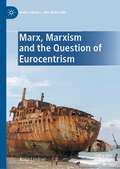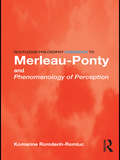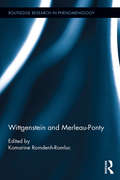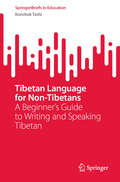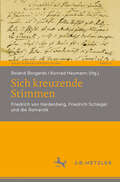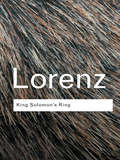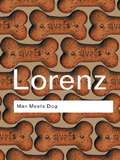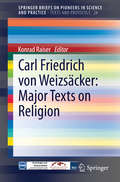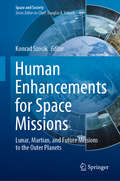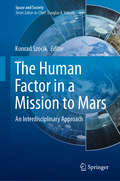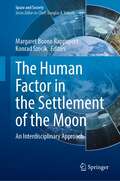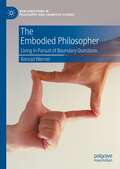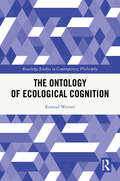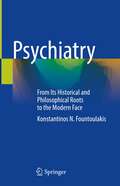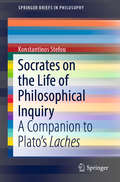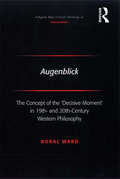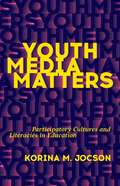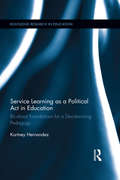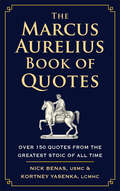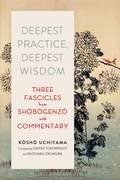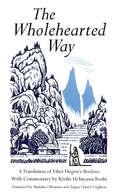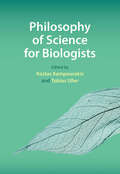- Table View
- List View
Marx, Marxism and the Question of Eurocentrism (Marx, Engels, and Marxisms)
by Kolja LindnerThis book mediates between postcolonial positions that criticize Marxist approaches (and Marx’s writings) for their Eurocentrism and defenders of Marx, who claim that this accusation is a myth. In different contributions to this volume, Kolja Lindner pleads for a differentiated assessment of the whole of Marx’s work, including less known manuscripts, and a theoretical reconstruction of various elements that have come into the focus of postcolonial critique: ethnocentrism, Orientalism, false universalism and the oblivion of modernity’s global entanglement. Against this background, two opportunities simultaneously arise: Marx’s Eurocentrism can be deconstructed and his growing awareness of global developments and cosmopolitan struggles established.
Routledge Philosophy GuideBook to Merleau-Ponty and Phenomenology of Perception (Routledge Philosophy GuideBooks)
by Komarine Romdenh-RomlucMaurice Merleau-Ponty (1908 – 1961) is hailed as one of the key philosophers of the twentieth century. Phenomenology of Perception is his most famous and influential work, and an essential text for anyone seeking to understand phenomenology. In this GuideBook Komarine Romdenh-Romluc introduces and assesses: Merleau-Ponty’s life and the background to his philosophy the key themes and arguments of Phenomenology of Perception the continuing importance of Merleau-Ponty’s work to philosophy. Merleau-Ponty and Phenomenology of Perception is an ideal starting point for anyone coming to his great work for the first time. It is essential reading for students of Merleau-Ponty, phenomenology and related subjects in the Humanities and Social Sciences.
Wittgenstein and Merleau-Ponty (Routledge Research in Phenomenology)
by Komarine Romdenh-RomlucMaurice Merleau-Ponty and Ludwig Wittgenstein are two of the most important philosophers of the twentieth century, yet their work is generally regarded as standing in contrast to one another. However, as this outstanding collection demonstrates they both reject a Cartesian picture of the mind and sought to offer an alternative that does justice to the role played by bodily action, language, and our membership within a community that shares a way of life. This is the first collection to compare and contrast the work of these two major philosophers. Fundamental topics and problems discussed include the role of community in their philosophies; Merleau-Ponty on description and depiction and Wittgenstein on saying and doing; the role of language; their treatment of expression; their relation to the philosophy of the Vienna Circle; solipsism; and rule-following. It is essential reading for anyone studying the work of Wittgenstein and Merleau-Ponty, as well as those interested in phenomenology, philosophy of mind, and philosophy of language.
Tibetan Language for Non-Tibetans: A Beginner's Guide to Writing and Speaking Tibetan (SpringerBriefs in Education)
by Konchok TashiThis book serves as a practical guidebook for non-Tibetan beginners who want to learn the Tibetan writing system and conversational Tibetan, but have never studied the language before. Based on modern colloquial Tibetan, it is founded on traditional Tibetan expression as well as the proper shape and style used by Tibetans in their daily lives, enabling learners to connect directly with Tibetans. This book is an outcome of the author’s in-depth research on Tibetan language for the last two and half decades and is the third book in the series of his research work devoted to the ‘Linguistic Studies of the lesser-known/endangered Languages of Indian Himalayas & beyond’. This book features a Foreword from His Holiness the 14th Dalai Lama.
Sich kreuzende Stimmen: Friedrich von Hardenberg, Friedrich Schlegel und die Romantik (Neue Romantikforschung #8)
by Roland Borgards Konrad HeumannFriedrich von Hardenberg und Friedrich Schlegel verdanken wir zwei der berühmtesten Denkfiguren der Romantik: die ‚blaue Blume‘ und die ‚progressive Universalpoesie‘. Ein wichtiger Quellpunkt solcher Denkfiguren ist der Briefwechsel zwischen Hardenberg und Schlegel, der 2022 anlässlich ihres 250. Doppelgeburtstages in einer Ausstellungreihe im Deutschen Romantik-Museum, Frankfurt am Main, zu sehen war. Begleitend zur Ausstellung hat sich eine Ringvorlesung des Instituts für Deutsche Literatur, Frankfurt, mit dem Anteil Hardenbergs und Schlegels an der frühromantischen Theoriebildung auseinandergesetzt. Der vorliegende Band dokumentiert die Beiträge dieser Ringvorlesung. Der Briefwechsel zwischen Hardenberg und Schlegel bildet dabei den Ausgangspunkt der Überlegungen. Im Zentrum stehen dabei zunächst der Brief als Medium des Symphilosophierens sowie Religion und Republik als zwei zentrale Themen des Briefwechsel. Dann aber weist der Band auch über die Fragen, die die beiden Frühromantiker im brieflichen Austausch entwickeln, hinaus. Der Akzent liegt dabei auf Themenfeldern, die in der Forschung bisher weniger intensiv aufgegriffen wurde: die Idylle, die Ökologie und die Chemie.
King Solomon's Ring: New Light On Animal Ways (Routledge Classics)
by Konrad LorenzSolomon, the legend goes, had a magic ring which enabled him to speak to the animals in their own language. Konrad Lorenz was gifted with a similar power of understanding the animal world. He was that rare beast, a brilliant scientist who could write (and indeed draw) beautifully. He did more than any other person to establish and popularize the study of how animals behave, receiving a Nobel Prize for his work. King Solomon's Ring, the book which brought him worldwide recognition, is a delightful treasury of observations and insights into the lives of all sorts of creatures, from jackdaws and water-shrews to dogs, cats and even wolves. Charmingly illustrated by Lorenz himself, this book is a wonderfully written introduction to the world of our furred and feathered friends, a world which often provides an uncanny resemblance to our own. A must for any animal-lover!
Man Meets Dog
by Konrad LorenzIn this wonderful book, the famous scientist and best-selling author, Konrad Lorenz, 'the man who talked with animals', enlightens and entertains us with his illustrated account of the unique relationship between humans and their pets. Displaying Lorenz's customary humanity and expert knowledge of animals, Man Meets Dog is also a deeply personal and entertaining account of his relationships with his own four-legged friends. With charming sketches on almost every page, Man Meets Dog offers a delightful insight into animal and human thinking and feeling. An essential companion for all lovers of dogs (and cats!).
Carl Friedrich von Weizsäcker: Major Texts On Religion (SpringerBriefs on Pioneers in Science and Practice #24)
by Konrad RaiserThis book presents a collection of texts by the German physicist and philosopher Carl Friedrich von Weizsäcker (1912-2007) in English, for use in seminars on the philosophy of religion, the comparative study of religion, but as well on the relationship between religion and the scientific worldview. Most texts appear in English for the first time. Weizsäcker became famous through his works in physics, mainly in the early development of nuclear physics. Later he would also become well known as a philosopher and analyst of contemporary culture. He also worked very intensely on projects for the prevention of nuclear war and for peace in general.
Human Enhancements for Space Missions: Lunar, Martian, and Future Missions to the Outer Planets (Space and Society)
by Konrad SzocikThis book presents a collection of chapters, which address various contexts and challenges of the idea of human enhancement for the purposes of human space missions. The authors discuss pros and cons of mostly biological enhancement of human astronauts operating in hostile space environments, but also ethical and theological aspects are addressed. In contrast to the idea and program of human enhancement on Earth, human enhancement in space is considered a serious and necessary option. This book aims at scholars in the following fields: ethics and philosophy, space policy, public policy, as well as biologists and psychologists.
The Human Factor in a Mission to Mars: An Interdisciplinary Approach (Space and Society)
by Konrad SzocikA manned mission to Mars is faced with challenges and topics that may not be obvious but of great importance and challenging for such a mission. This is the first book that collects contributions from scholars in various fields, from astronomy and medicine, to theology and philosophy, addressing such topics. The discussion goes beyond medical and technological challenges of such a deep-space mission. The focus is on human nature, human emotions and biases in such a new environment.The primary audience for this book are all researchers interested in the human factor in a space mission including philosophers, social scientists, astronomers, and others. This volume will also be of high interest for a much wider audience like the non-academic world, or for students.
The Human Factor in the Settlement of the Moon: An Interdisciplinary Approach (Space and Society)
by Konrad Szocik Margaret Boone RappaportApproaching the settlement of our Moon from a practical perspective, this book is well suited for space program planners. It addresses a variety of human factor topics involved in colonizing Earth's Moon, including: history, philosophy, science, engineering, agriculture, medicine, politics & policy, sociology, and anthropology. Each chapter identifies the complex, interdisciplinary issues of the human factor that arise in the early phases of settlement on the Moon. Besides practical issues, there is some emphasis placed on preserving, protecting, and experiencing the lunar environment across a broad range of occupations, from scientists to soldiers and engineers to construction workers. The book identifies utilitarian and visionary factors that shape human lives on the Moon. It offers recommendations for program planners in the government and commercial sectors and serves as a helpful resource for academic researchers. Together, the coauthors ask and attempt to answer: “How will lunar society be different?”
The Embodied Philosopher: Living in Pursuit of Boundary Questions (New Directions in Philosophy and Cognitive Science)
by Konrad WernerThe book is the first formulation of a meta-philosophical scheme rooted in the embodied cognition paradigm. The latter views subjects capable of cognition and experience as living, embodied creatures coupled with their environments. On the other hand, the emergence of experimental philosophy has given rise to a new context in which philosophers have begun to search for a more thorough definition of philosophical competence. The time is ripe for these two trends to join their efforts. Therefore, the book discusses what it means for a human being thought of as a living subject to pursue philosophy. In this context, in contrast to the existing literature, philosophical competence must not be conflated with competence in philosophy. The former is a skill or attitude. The book refers to this peculiar attitude as the recognition of one’s epistemic position.
The Ontology of Ecological Cognition (Routledge Studies in Contemporary Philosophy)
by Konrad WernerThis book provides the first explicit examination of the underlying ontology of the ecological/embodied cognition philosophical project. More specifically, it examines the locative concepts used by defenders of representationalism and the more environmentally oriented, ecological/embodied views on cognition.The book’s main argument is that ecological/embodied cognition is embedded in various philosophical traditions. It establishes that there is a lack of clarity in how we conceptualize locative relations in contexts having to do with cognition. The book tackles questions of what it means that internal representations are internal, that the external world is external, that the extended mind is extended, how we should understand the claim that cognition and consciousness are in the head, or, alternatively, in the environment. Additionally, it addresses what it means that cognition enacts an environment, which is likely the most controversial claim made in some branches of embodied cognition. The goal of the book is to capture the essential traits of cognition thought of as an ecological phenomenon – as a factor determining a specific locus – and thereby elicit how cognition takes part in the creation of the world as we know it.The Ontology of Ecological Cognition will appeal to scholars and graduate students working in philosophy of mind, cognitive science and metaphysics.
Kant’s Theory of Normativity
by Konstantin PollokKonstantin Pollok offers the first book-length analysis of Kant's theory of normativity that covers foundational issues in theoretical and practical philosophy as well as aesthetics. Interpreting Kant's 'critical turn' as a normative turn, he argues that Kant's theory of normativity is both original and radical: it departs from the perfectionist ideal of early modern rationalism, and arrives at an unprecedented framework of synthetic a priori principles that determine the validity of our judgments. Pollok examines the hylomorphism in Kant's theory of normativity and relates Kant's idea of our reason's self-legislation to the 'natural right' tradition, revealing Kant's debt to his predecessors as well as his relevance to contemporary debates on normativity. This book will appeal to academic researchers and advanced students of Kant, early modern philosophy and intellectual history.
Psychiatry: From Its Historical and Philosophical Roots to the Modern Face
by Konstantinos N. FountoulakisThis book was the end product of life experiences, thoughts and intellectual wanderings of the author, who through his career and for the last twenty years was always serving all the three aspects of a Psychiatrist: He is a clinician, a researcher and an academic teacher. The book includes a comprehensive history of Psychiatry since antiquity and until today, with an emphasis not only on main events but also specifically and with much detail and explanations, on the chain of events that led to a particular development. At the center of this work is the question ‘What is mental illness?’ and ‘Does free will exist?’. These are questions which tantalize Psychiatrists, neuroscientists, psychologists, philosophers, patients and their families and the sensitive and educated lay persons alike. Thus, the book includes a comprehensive review and systematic elaboration on the definition and the concept of mental illness, a detailed discussion on the issue of free will as well as the state of the art of contemporary Psychiatry and the socio-political currents it has provoked.Finally the book includes a description of the academic, social and professional status of Psychiatry and Psychiatrists and a view of future needs and possible developments. A last moment addition was the chapter on conspiracy theories, as a consequence of the experience with the social media and the public response to the COVID-19 outbreak which coincided with the final stage of the preparation of the book. Their study is an excellent opportunity to dig deep into the relation among human psychology, mental health, the society and politics and to swim in intellectually dangerous waters.
Socrates on the Life of Philosophical Inquiry: A Companion to Plato’s Laches (SpringerBriefs in Philosophy)
by Konstantinos StefouThis book offers the first systematic reading of Plato’s Laches in English after three decades of scholarly silence. It rekindles interest in this much-neglected dialogue by providing a fresh discussion of the major issues that arise from the text. Among these issues, pride of place is taken by the virtue of courage, for the definition of which Socrates is depicted as engaging in some long-winded dialectical exchange with his interlocutors. Yet, although there is no room for doubt that the Laches is Plato’s most explicit treatment of courage, this dialogue ends in perplexity and is thus traditionally thought of as an unsuccessful attempt to define what courage is. The present study challenges this suggestion. This book proposes a new paradigm for the interpretation of Plato’s Laches. In fact, it constitutes the first systematic attempt to study the dialogue in light of the idea that its composition could well have formed part of Plato’s overall plan to establish a well-defined and rigorous justification of the life of philosophical inquiry The book will be of key interest to classicists, philosophers, and intellectual historians, but will also appeal to students or anyone interested in ancient Greek philosophy.
Coaching Values and Life Skills through Physical Education and Sports: A Practical Toolkit
by Koon Teck Koh Tarkington J Newman Muhammad Shufi Bin SallehThis impactful resource guide is for international educators and practitioners involved in Physical Education and Sport (PES) who want to learn evidence-based approaches to the teaching of values and character education. Through a systematic approach to teaching and evaluating values and character education, this book bridges the gap between theory and practice. It offers empirical evidence and strategies to show how values and character can be internalized, through carefully designed experiences, active participation, and regular reinforcement, without compromising the time needed to learn sports skills - a common concern raised by PE teachers and sports coaches. Results from case studies have also revealed that values can be transferred beyond the context of physical education lessons and sports through a collaborative approach and effective communication between teachers, coaches, and parents. Key strategies based on empirical evidence are highlighted in this book. It also highlights an Asian perspective on values and life skills training through Physical Education and provides readers with step-by-step implementation guidelines to simplify some complex strategies in developing values and life skills through PES seamlessly.The book provides useful information to anyone engaged in developing young people in, and through, sport. In particular it will be of great value to pre-service and in-service teachers and coaches for implementing effective strategies to balance teaching sports skills, values, and life skills effectively in PES.
Augenblick: The Concept of the 'Decisive Moment' in 19th- and 20th-Century Western Philosophy (Ashgate New Critical Thinking In Philosophy Ser.)
by Koral WardAugenblick, meaning literally 'In the blink of an eye', describes a 'decisive moment' in time that is both fleeting yet momentously eventful, even epoch-makingly significant. In this book Koral Ward investigates the development of the concept into one of the core ideas in Western existential philosophy alongside such concepts as anxiety and individual freedom. Ward examines the whole extent of the idea of the 'decisive moment', in which an individual's entire life-project is open to a radical reorientation. From its inception in Kierkegaard's works to the writings of Jaspers and Heidegger, she draws on a vast array of sources beyond just the standard figures of 19th and 20th century Continental philosophy, finding ideas and examples in photography, cinema, music, art, and the modern novel.
Youth Media Matters: Participatory Cultures and Literacies in Education
by Korina M. JocsonIn an information age of youth social movements, Youth Media Matters examines how young people are using new media technologies to tell stories about themselves and their social worlds. They do so through joint efforts in a range of educational settings and media environments, including high school classrooms, youth media organizations, and social media sites. Korina M. Jocson draws on various theories to show how educators can harness the power of youth media to provide new opportunities for meaningful learning and &“do-it-together production.&” Describing the impact that youth media can have on the broader culture, Jocson demonstrates how it supports expansive literacy practices and promotes civic engagement, particularly among historically marginalized youth.In Youth Media Matters, Jocson offers a connective analysis of content area classrooms, career and technical education, literary and media arts organizations, community television stations, and colleges and universities. She provides examples of youth media work—including videos, television broadcasts, websites, and blogs—produced in the San Francisco Bay Area, Los Angeles, New York, and St. Louis. At a time when educators are increasingly attentive to participatory cultures yet constrained by top-down pedagogical requirements, Jocson highlights the knowledge production and transformative potential of youth media with import both in and out of the classroom.
Service Learning as a Political Act in Education: Bicultural Foundations for a Decolonizing Pedagogy (Routledge Research in Education #9)
by Kortney HernandezDisrupting assumptions and commonsensical ideologies of "service," Service Learning as a Political Act in Education presents a clear and systematic analysis that unveils the rampant contradictions within the service learning field. By providing a careful, critical bicultural examination of the field, this book questions the relentless insertion of service learning programs into working-class, bicultural communities. Through a decolonizing lens, this book offers a radical political confrontation of service learning ideologies and practices.
The Marcus Aurelius Book of Quotes: Over 150 Quotes from the Greatest Stoic of All Time
by Nick Benas Kortney YasenkaDiscover the timeless wisdom of Marcus Aurelius, one of history's greatest Stoic philosophers, in this compelling collection of quotes and sayings.Marcus Aurelius lived a life that epitomized the principles of Stoicism, gaining profound control over his thoughts, emotions, and actions. The Marcus Aurelius Book of Quotes brings together over 150 of his most insightful sayings, musings, and observations, offering readers a treasure trove of wisdom.In a world where many strive to improve their lives, find happiness, and achieve fulfillment, Marcus Aurelius' teachings provide enduring guidance. His reflections address fundamental questions such as:• What will make me feel more fulfilled?• How can I build stronger relationships?• What contributes to a successful and meaningful life?• How can I live free from anxiety and depression?The teachings of Marcus Aurelius offer a roadmap to a balanced, contented, and purposeful life. The wisdom contained in The Marcus Aurelius Book of Quotes continues to resonate, offering clarity and direction for those seeking to navigate the complexities of modern living.
Deepest Practice, Deepest Wisdom: Three Fascicles from Shobogenzo with Commentary
by Tom Wright Shohaku Okumura Kosho UchiyamaInsightful commentary on a beloved ancient philosopher of Zen by a beloved contemporary master of Zen. Famously insightful and famously complex, Eihei Dogen’s writings have been studied and puzzled over for hundreds of years. In Deepest Practice, Deepest Wisdom, Kosho Uchiyama, beloved twentieth-century Zen teacher addresses himself head-on to unpacking Dogen’s wisdom from three fascicles (or chapters) of his monumental Shobogenzo for a modern audience. The fascicles presented here from Shobogenzo, or Treasury of the True Dharma Eye include “Shoaku Makusa” or “Refraining from Evil,” “Maka Hannya Haramitsu” or “Practicing Deepest Wisdom,” and “Uji” or “Living Time.” Tom Wright and Shohaku Okumura lovingly translate Dogen’s penetrating words and Uchiyama’s thoughtful commentary on each piece. At turns poetic and funny, always insightful, this is Zen wisdom for the ages.
The Wholehearted Way
by Taigen Dan Leighton Shohaku Okumura Kosho Uchiyama RoshiThe Wholehearted Way is a translation of Eihei Dogen's Bendowa, one of the primary texts on Zen practice. Transcending any particular school of Buddhism or religious belief, Dogen's profound and poetic writings are respected as a pinnacle of world spiritual literature. Bendowa, or A Talk on the Wholehearted Practice of the Way, was written in 1231 A.D. and expresses Dogen's teaching of the essential meaning of zazen (seated meditation) and its practice. This edition also contains commentary on Bendowa by Kosho Uchiyama Roshi, a foreword by Taigen Daniel Leighton, and an Introduction by Shohaku Okumura, both of whom prepared this English translation.
The Wholehearted Way
by Taigen Dan Leighton Shohaku Okumura Kosho Uchiyama RoshiThe Wholehearted Way is a translation of Eihei Dogen's Bendowa, one of the primary texts on Zen practice. Transcending any particular school of Buddhism or religious belief, Dogen's profound and poetic writings are respected as a pinnacle of world spiritual literature. Bendowa, or A Talk on the Wholehearted Practice of the Way, was written in 1231 A.D. and expresses Dogen's teaching of the essential meaning of zazen (seated meditation) and its practice. This edition also contains commentary on Bendowa by Kosho Uchiyama Roshi, a foreword by Taigen Daniel Leighton, and an Introduction by Shohaku Okumura, both of whom prepared this English translation.
Philosophy of Science for Biologists
by Kostas Kampourakis Tobias UllerBiologists rely on theories, apply models and construct explanations, but rarely reflect on their nature and structure. This book introduces key topics in philosophy of science to provide the required philosophical background for this kind of reflection, which is an important part of all aspects of research and communication in biology. It concisely and accessibly addresses fundamental questions such as: Why should biologists care about philosophy of science? How do concepts contribute to scientific advancement? What is the nature of scientific controversies in the biological sciences? Chapters draw on contemporary examples and case studies from across biology, making the discussion relevant and insightful. Written for researchers and advanced undergraduate and graduate students across the life sciences, its aim is to encourage readers to become more philosophically minded and informed to enable better scientific practice. It is also an interesting and pertinent read for philosophers of science.
